Home » Kitchen Design
Category Archives: Kitchen Design
How to Budget for Bathroom Remodeling
Whether you opt for bold patterns in tile or more subtlety through wallpaper, the right decor can add much character. But this is an area where budgeting is important. For more information just visit Milwaukee Bathroom Remodel.
A licensed contractor can help you find ways to meet your goals while keeping costs in check. They have professional contacts with plumbers, electricians, and tile setters who can handle the tasks involved in a bathroom remodel.
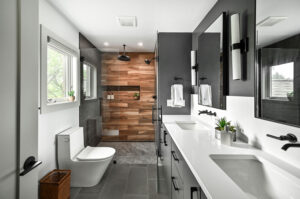
It’s important to think about how you want the room to look and function before starting any bathroom remodeling. There are many design elements to consider, including paint color choices, showers, vanities, and tubs. Make sure to choose items that complement each other and fit your style. Also, remember to maximize the space with a good layout that suits your family’s needs.
If you’re planning to add windows or skylights, it’s essential to check with your local building codes to see if they require permits. Depending on the scope of your remodel, you may also need a permit for electrical and plumbing work.
If you completely overhaul your bathroom, hiring a general contractor specializing in these types of projects is smart. This will ensure that the project runs smoothly from start to finish. In addition, a general contractor will know what to do if something unexpected happens during the job. Additionally, they’ll have experience working with subcontractors to complete the job quickly and efficiently. Finally, a general contractor can help you find the best materials and fixtures for your budget. They can also provide you with a timeline for the project. They can even offer a 3D bathroom model to show how it will turn out.
When remodeling a bathroom, plumbing changes are inevitable. Adding new pipes, relocating existing ones, and replacing fixtures will add to the cost of your remodel. It’s always best to have a budget and allow for unexpected expenses. If you find yourself in a cash crunch, try looking for a credit card that offers a low- or no-interest introductory rate on balance transfers. Pay off the debt before the initial period ends and the regular interest rates take effect.
Before hiring contractors for your remodel, request proof of licensing and insurance. Check with your city’s building department to find out what license requirements are in your area. The contractor should carry personal liability, workers’ compensation, and property damage coverage.
While a DIY (do-it-yourself) project might seem tempting, it’s often not worth the headache and risk. A remodel requires specialized knowledge and tools and can seriously damage your home if not done correctly.
It’s important to remember that the type of remodeling you choose will impact the value of your home. Creating a unique or trendy space may appeal to you but could deter future buyers who prefer more traditional styles. It’s also a good idea to consider the needs of family members who will use the bathroom, including children and elderly relatives. For example, installing a bathtub might be a practical choice for a growing family.
Many bathroom remodels require new electrical wiring. This may include adding a dedicated circuit for your sink and vanity, replacing existing outlets with GFCI outlets, or upgrading the 15-amp wiring in older homes to a 20-amp service. This step is important because it improves safety, bringing older wiring up to the current code.
Your electrician will replace existing outlets close to water sources with GFCI outlets. This prevents electrocution hazards if someone forgets to turn off the hair dryer or accidentally knocks a towel over a plug in the wall.
Many remodels also involve creating new outlets to accommodate all the various appliances you use in your bathroom – everything from curling irons and hair straighteners to toothbrushes and shaver chargers. It’s a good idea to upgrade to recessed lighting and add more lighting.
While you could tackle some remodeling tasks yourself, working with a licensed contractor with bathroom experience is best. This will ensure that the job is done correctly and efficiently. In addition, a licensed contractor will offer warranties for the renovation work.
Bathrooms tend to get a lot of moisture, so choosing the right flooring is incredibly important. The wrong choice could spell disaster. The best alternative is something that can withstand a fair amount of moisture and splashes, like vinyl or tile. Durable concrete is one of the edgier options, and it can pop in a modern design. Just be sure it’s properly sealed because untreated concrete is porous and susceptible to water damage.
Vinyl and laminate can also work well in a bathroom but must be properly sealed. Otherwise, moisture can seep between the seams, leading to swelling or even mold. Vinyl is typically designed with a grippy surface to reduce slips, and it comes in trendy wood-look and stone-look designs that can fit a wide range of aesthetics. Laminate is less durable but also available in wood-look and stone-look styles.
If you’re using a contractor, they can help you select the perfect flooring for your bathroom remodeling project. They can also handle all of the permitting and board approvals if necessary. For most projects, you’ll need a permit from your local planning or building department before construction begins. This can take a few days or weeks, depending on your municipality and the efficiency of the permit process. Many contractors can handle the permitting process on your behalf, and they’ll be familiar with the requirements for working in a bathroom.
If you’re a homeowner who wants to give your bathroom a sleeker look, consider replacing the cabinets with custom-fitted units. While this will cost more than prefabricated options, it will provide you with a cabinet that perfectly fits your space and will enhance the overall aesthetic of your bathroom. Custom cabinets will also appeal to homebuyers and add value to your home.
Replacing the vanity with a new one is another remodeling option that can add a dramatic and stylish change to your bathroom. Vanities can be made from various materials, from solid wood to glass and stone. Try a recessed medicine cabinet above the vanity to add more storage to your bathroom. This may require extra wall framing work, but the sleek look will be worth it.
You can also refresh your bathroom by painting the walls. This is a quick and inexpensive way to completely transform the look of your bathroom, but be sure to use moisture and mold-resistant paint. If your home was built before 1979, you’ll likely need to have the lead painted out.
Some remodeling projects will require a permit, such as changing the layout of your bathroom or adding a steam shower. Your Sweeten contractor can help you determine if your project falls into this category and can guide you through applying for a permit and obtaining building board approvals, if necessary.
A well-lit bathroom is critical to safety, comfort, and appearance. Various lights should be used, including task lighting around the mirror, decorative sconces, and dimmers for mood. Vanity lights are popular and can be customized with your style and fixture. To complete the room’s design, shower doors and window treatments should be carefully considered.
Moisture control is another crucial issue in bathrooms. All bathrooms must have good ventilation to eliminate moisture and prevent the growth of mildew and mold, which can cause health issues.
Ventilation options include exhaust fans, window vents, or a combination of both. Window vents are especially effective in powder rooms, requiring much less air space than bathing areas. Window vents must meet building code requirements to ensure they are open enough to remove the moisture produced in bathrooms effectively.
Many other items should be addressed during a bathroom remodeling to ensure it meets current building codes and is safe for its occupants. The most important considerations are that a licensed contractor perform the work and that the proper permits are obtained before the work begins. If the bathroom is located in a condominium or homeowners association, the homeowner’s approval may be required to proceed with the project. It is also wise to check the association’s governing document to see what procedures are necessary for moving forward with any remodeling projects.
KBIS Plans Proceeding Amidst Strict Virus Protocols
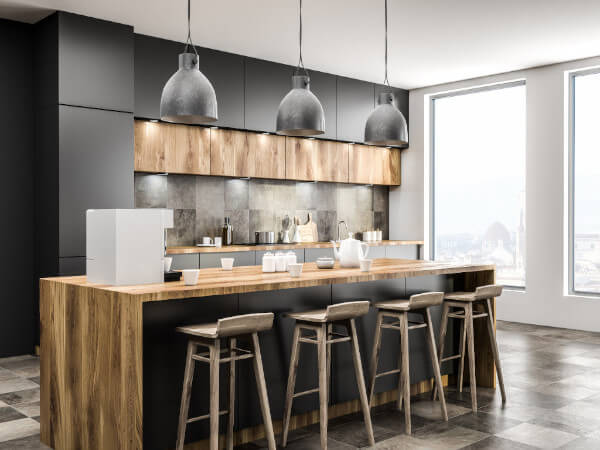
HACKETTSTOWN, NJ — The National Kitchen & Bath Association and its partners for February’s Design & Construction Week continue to consult with Epistemix, a third-party modeling system that predicts the progression of disease outbreaks, as plans proceed to stage the 2022 Kitchen & Bath Industry Show (KBIS) and concurrent International Builders Show (IBS) as live events in February, show organizers said.
The NKBA and its trade show partners, Emerald and the National Association of Home Builders, announced that, based on the latest data modeling from Epistemix and current DCW Health & Safety protocols, “we feel confident we are creating a safe environment to conduct business” at the annual event, scheduled for Feb. 8-10 at the Orange County Convention Center in Orlando, FL. The 2021 KBIS and IBS were converted to digital events in the face of the COVID-19 pandemic.
“The countdown to KBIS 2022 and Design & Construction Week in is on, and we are looking forward to hosting over 60,000 residential design and construction professionals for a fantastic in-person event,” said Brian Pagel, executive v.p., and Jason McGraw, group v.p. for Emerald. “As the event is quickly approaching, the safety and wellbeing of our attendees, partners, exhibitors, site workers and staff remains our top priority.” Pagel and McGraw said that show organizers will continue to monitor health and safety recommendations through additional Epistemix modeling in early January. The KBIS show team will host a webinar in mid-January to outline their findings and detail the health and safety protocols.
All attendees and exhibitors at the three-day event will be required to provide a negative test OR proof of vaccination to access the convention hall. Masks will also be required in the Orange County Convention Center, as well as on official shuttle buses, show organizers said.
“We look forward to welcoming everyone back to Orlando for an incredible show experience,” Pagel and McGraw said.
Current health and safety protocols for Design & Construction Week can be accessed at the NKBA’s web site, www.nkba.org.
The post KBIS Plans Proceeding Amidst Strict Virus Protocols appeared first on Kitchen & Bath Design News.
Did you miss our previous article…
https://www.texaspiekitchen.org/?p=885
Collaboration Transforms Kitchen
Rowayton, CT — Karen Berkemeyer and Leslie Dunn often work together to create their clients’ dream kitchens and baths, with the former focusing on kitchen/bath design skills and the latter incorporating interior design touches for their respective companies of Karen Berkemeyer Home in Westport, CT, and Dunn Designs in Norwalk, CT. This kitchen, along with the master bath and a guest bath, was no exception…however, this time the resultant collaboration was showcased in Dunn’s personal residence.
“We work really well together,” says Berkemeyer, noting a mutual respect for each other’s talents, which makes for great collaborations. “As a kitchen and bath designer, I focus on making sure these spaces technically and functionally work correctly. Partnering with another professional, such as an interior designer, gives clients the best of two worlds since multiple people are working on the same project. I love working with Leslie because she is so creative and has great taste. She is especially talented and creative with paint.”
Contrasting color
Paint, at opposite ends of the color spectrum, is a focus of Dunn’s kitchen, where the bright white island is contrasted with dark black perimeter cabinets.
“The use of color – combined with very simple cabinet door styles, which are a great choice for today’s kitchens – makes this design stand out,” says Berkemeyer.
Black perimeter cabinets served as the starting point for color. “She really wanted to do black cabinets,” Berkemeyer indicates.
As a contrast, the island was designed to look like a table that Dunn found, notes the designer. “Island and perimeter cabinets don’t necessarily have to match in cabinet style or color,” she says. “In fact, when done well, like in this kitchen, having them not match shows a lot of creativity and makes for an interesting design.”
Keeping cabinet styles simple is the key to making a ‘mismatch’ work, says the designer in reference to the flat-panel, flush-inset Wood-Mode perimeter cabinets and full-overlay, shallow-cut, Shaker-style Signature Custom Cabinetry cabinets on the island. Both are sheathed with custom colors selected by Dunn.
“You would never do this perimeter with oak raised-panel doors on the island,” she says. “This perimeter features a very simple door style, as does the island. They play off of each other well. This entire kitchen has created so much interest from people. They see things they would have never thought of doing…and they like the result.”
The designers also kept the cabinet hardware unpretentious. Pulls on the perimeter cabinets bring to mind cleats used to anchor boats to a dock, giving the space a bit of a nautical vibe that pays homage to the water just beyond the kitchen windows. For the island, they incorporated drawer pulls that resemble those found on a filing cabinet. Berkemeyer also designed the island with seating for four, positioning stools at a right angle to facilitate conversation between guests. The designer also added custom brushed steel accents at each leg base.
“They add another texture to the space and make the island more interesting,” she says.
To continue the contrast between light and dark, Berkemeyer topped the island with white marble, which she built up with a 2″ mitered edge. The perimeter features median-black, charcoal-colored quartz with a leathered finish for added texture.
White 3″x6″ subway tile covers the walls, extending from the countertop to the windows and beyond. Its undulated surface offers a rippled appearance while its stark light color juxtaposes against the blackness of the shallow-depth soffit on the ceiling.
“I thought the kitchen stopped too abruptly in the corner,” notes Berkemeyer in reference to the soffit. “I suggested that we add the soffit, extending it to the refrigerator on one wall and across the length of the windows on the other. It really helps pull the whole kitchen together.”
Additional dark-hued accents include the deep blue paint that adorns the window trim. “She really likes to include the unexpected!” she says.
Overcoming storage challenges
To make better use of the kitchen’s footprint and gain a few extra feet of space, the designers removed walls between the living room and kitchen, eliminating a hallway in the process. To provide visual differentiation between the two spaces without adding a physical barrier, they added reclaimed antique beams in the ceiling, extending them into the living room.
“Previously, her home had an enclosed little kitchen with separate living room,” says Berkemeyer. “Now, the kitchen is more open and looks so much larger. Taking down the wall also made it possible to include the island.”
Even with the additional space gained by removing the hall, storage was a challenge for the relatively petite kitchen. “When spaces are smaller, like in this kitchen, the biggest design challenge is usually storage,” she says. “It’s important to make the most of whatever space you have, and to make everything accessible, especially focusing on corners. Taking cabinets up to the ceiling maximizes the space. It’s important, too, to pay attention to clearances, ensuring that walkways are technically correct and easy to maneuver.”
To overcome storage concerns in Dunn’s kitchen, Berkemeyer included specialized corner organization accessories, recycling bins, pull-out drawers and several large drawers to make contents easy to access.
Glass panels in the wall cabinets provide a brief glimpse of their contents and keep the space visually ‘light.’ “Like the rest of the kitchen, the glass is kept clean, without any mullions, to maintain the desired look for the space,” she concludes. 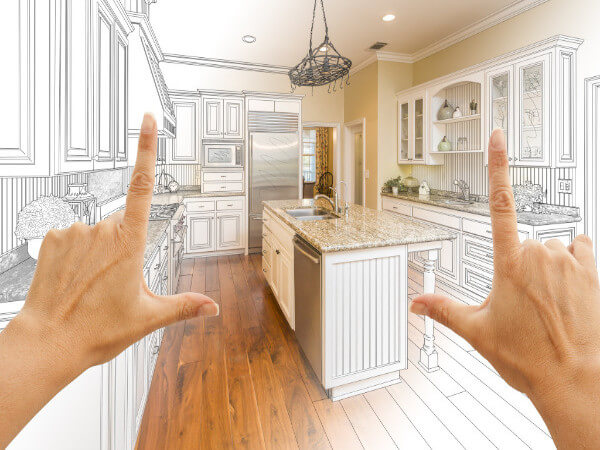
The post Collaboration Transforms Kitchen appeared first on Kitchen & Bath Design News.
Did you miss our previous article…
https://www.texaspiekitchen.org/?p=879
Wellness Features Termed a ‘Necessity’ for Today’s Homes
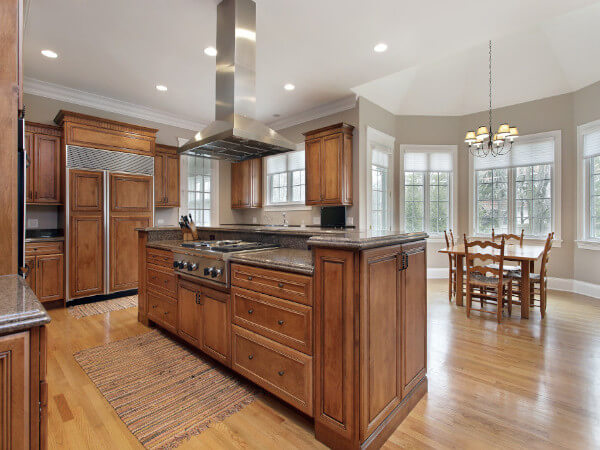
INDIANAPOLIS — Wellness features, impacted by the COVID-19 pandemic and an elevated awareness of indoor environments’ impact on physical and mental health, are no longer a luxury, but rather a necessity in today’s homes, a leading wellness expert contends.
According to Dr. Jie Zhao, exec. v.p. of Delos, a New York-based wellness real estate and technology company, COVID-19 has literally reshaped the way homes – including kitchens and baths – will be designed, built, equipped and remodeled in years to come.
“People are much more cognizant of the important role that homes play in our lives, and how these environments can have a positive or negative impact on the wellness of their inhabitants,” Jie said.
At the recent “Insights Summit,” an annual event sponsored by the Home Improvement Research Institute (HIRI), Jie outlined four key wellness trends that he believes will have the greatest impact on home improvement in the post-pandemic world. Among them:
• Indoor Air Quality: Because viruses spread through the air much easier than by surface contact, the pandemic shed light on the importance of indoor air quality, or IAQ, as a component of a healthy home, Jie said.
“Air filtration is vital to the reduction of particle transmission,” he observed. “Not only can air-cleaning technologies improve peace of mind when it comes to invisible health threats like COVID-19, they also tackle visible particles in the air such as smoke and other harmful particles.”
Jie said that ventilation and/or ionization technology will be at the forefront of the fight against contaminated air in home spaces. “For this reason, IAQ may be the biggest wellness trend to have emerged from the pandemic,” he noted.
• Mental Wellness: Mental wellness issues persisted long before the emergence of the coronavirus, but the amount of attention devoted to the topic increased significantly afterward, Jie said, noting that mental health came to the forefront of conversation due to isolation during stay-at-home orders.
Jie observed that one result of this for the home-improvement industry is the general migration away from congested cities in favor of larger residences, more nature and less commuting time. Jie also pointed to the effect of mental wellness on increased demand in certain product categories, including home entertainment, artists’ supplies, sports equipment and pets.
• Home Offices: Another major change emerging from the pandemic is the increased importance of the home office.
“Many employees have made investments in their home offices and have gotten used to working from home,” Jie said, pointing to surveys which found that 80% of workers want to be able to work from home three days per week, and 92% want at least one remote workday per week.
“There has been a rise in office furniture and accessories that support health and wellness, such as the standing desk or ergonomic keyboard,” Jie said, adding that 20-25% of companies are currently reimbursing their employees for wellness-related home office supplies and furniture, “hinting at the prospect that work-from-home may be around well into the coming years.”
• Fitness: While the spread of COVID-19 led to the temporary closure of most gyms and athletic institutions, it gave rise to new home fitness technologies, as people sought to stay fit within the confines of their own homes, Jie pointed out.
“Companies like Peloton and MIRROR are changing the way we think about fitness (and) combining the physical and virtual,” he said. “Consumers not only purchase a piece of gym equipment for their home, but they buy into an entire online social and content experience.”
“I expect to see more integration with online fitness platforms and home décor,” he said. “People want convertible spaces, so the easier their equipment blends with their home and lifestyle, the better.”
The post Wellness Features Termed a ‘Necessity’ for Today’s Homes appeared first on Kitchen & Bath Design News.
Did you miss our previous article…
https://www.texaspiekitchen.org/?p=870
Exertis Acquires Almo Corporation

Philadelphia – DCC Technology, a Dublin, Ireland-based technology distribution and services business that trades as Exertis, has acquired Almo Corporation in North America.
The move extends the company’s international scale in the Pro AV sector and ramps up its expansion in the North American market. The addition of Almo Corporation builds on other acquisitions in North America such as Stampede, Jam Industries, The Music People and JB&A. It expands Exertis’ Pro AV capability to form the largest specialist Pro AV business in North America.
Alongside its Pro AV business, Almo Corporation is the largest distributor of mainstream appliances, delivering a comprehensive portfolio of products including full kitchen packages with essential appliances to small and medium-sized retailers throughout the U.S. In addition, it is the leading distributor of premium appliances, serving retailers and builders designing luxury residential installations for refrigeration, ventilation and cooking in both indoor and outdoor settings. Almo’s business in consumer appliances and lifestyle products will add scale to Exertis North America’s business in the consumer channel.
Almo’s 75-year-old, third-generation, family-owned business brings 660 employees, nine distribution centers and more than 2.5 million square feet of warehousing space across North America. Almo Corporation will benefit from leveraging Exertis’ financial resources and supply-chain logistics, according to the company. The acquisition will provide Exertis North America with increased back-end economies of scale allied to the front-end specialization.
Almo will continue to be operated by the Chaiken Family, with Warren Chaiken as president and CEO and Gene Chaiken as Chairman. The combined Exertis and Almo Pro AV divisions will, in due course, be led by Sam Taylor, current exec. v.p. & COO of Almo Pro AV. Shortly after the completion of the integration, the combined business will be rebranded as Exertis Almo Pro AV.
John Dunne, a long-time senior executive with Exertis, currently leading the Exertis Pro AV team in North America, will join the Almo executive team and help lead the integration. The Premium Appliances and Mainstream Appliances divisions will continue to be led by Steve Terry and Jack Halperin, respectively.
Exertis’ expanded North American operation becomes a $2.4 billion business overseen by Martin Szpiro, managing director of Exertis North America. It forms part of the international expansion strategy of Exertis International, under Managing Director Clive Fitzharris.
Tim Griffin, DCC Technology & Exertis managing director said, “The acquisition of Almo Corporation is the largest in DCC’s history and signals our confident and ambitious intent to expand DCC Technology. By integrating Almo with our North American business, we will form the largest specialist Pro AV business in North America. Almo’s 75-year history of growth and success, combined with its longstanding relationships with industry partners and its ability to continually innovate and expand will be great assets to Exertis. In turn, we will bring significant economies of scale, global supply chain access and other benefits to the customers of Almo Corporation.”
Warren Chaiken, Almo Corporation president & CEO stated, “Having just completed a year-long celebration of 75 years of growth and business success, the time is right to give our manufacturer and channel partners a truly global distribution stage so they can operate their businesses at a greater capacity, leverage more buying power and the ability to compete for a more comprehensive position in the global supply chain. We are committed to growing with our partners by remaining their value-added distributor with larger scale and access to more products, more services and more financial support. For them, this transition will be seamless in that we will operate business as usual.”
The post Exertis Acquires Almo Corporation appeared first on Kitchen & Bath Design News.
Did you miss our previous article…
https://www.texaspiekitchen.org/?p=861
2021 Home Spending Continued at ‘Dizzying Pace,’ Report Finds
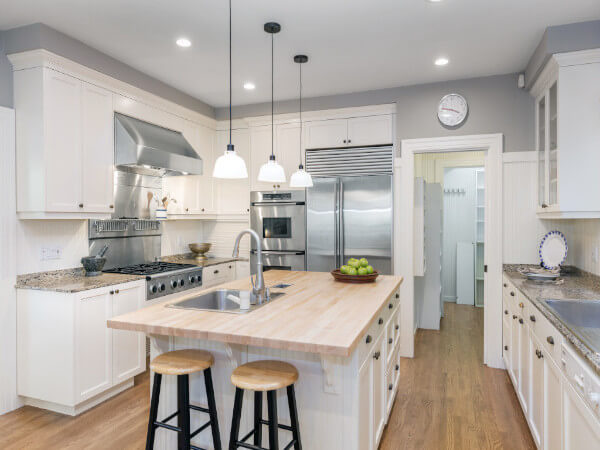
DENVER — Not only did homeowners spend more on their homes in 2021, but they also completed more projects, according to a new report by Angi, the Denver-based firm that links homeowners with remodeling and other home-related professionals.
According to Angi’s report annual 2021 State of Home Spending Report – entitled The Great Shift: How the Pandemic Put Homes in Focus – surveyed homeowners spent an average of $15,680 on home improvement, home maintenance and emergency repairs in 2021, and took on an average of 14.4 separate home projects.
“The growth in home spending we witnessed continued at a dizzying pace as people have continued spending more time in their homes,” said Mischa Fisher, chief economist for Angi, whose annual report focuses on trends in home spending including drivers, obstacles, top projects and forecasts for the years ahead.
“2021 also presented homeowners with trillions of dollars of unexpected home equity and that wealth has been, at least in part, reinvested in the home through improvements, maintenance and repairs,” Fisher observed. “Pre-pandemic, people were motivated to work on their homes for a return on investment or other financial incentives. Now, they’re prioritizing projects that help their homes better suit their new normal,” she added.
The most popular home project of 2021 was interior painting, completed by nearly one in three homeowners (32%), followed by bathroom remodels (28%) and installing smart home devices (27%). Other top projects include flooring (26.7%), landscaping (24.7%), exterior painting (24.2%), kitchen remodels (23.7%), fencing (23.1%), new roofing (19.6%) and new cabinets (19.5%).
The Angi report also asked homeowners what home projects they would do if given $10,000. While the overall top project was a living room upgrade, selected by 17% of homeowners, the different priorities of men and women were clear. Male homeowners prioritized living room upgrades (18%), outdoor space upgrades (17%) and bedroom upgrades (15%), while women were more interested in kitchen remodels (21%), bathroom upgrades (17%) and outdoor space upgrades (16%).
The State of Home Spending was based on Angi’s analysis of surveys fielded to 6,400 consumers in early October, the company said.
The post 2021 Home Spending Continued at ‘Dizzying Pace,’ Report Finds appeared first on Kitchen & Bath Design News.
Leads Robust, But Margins Being Squeezed, KBDN Survey Finds
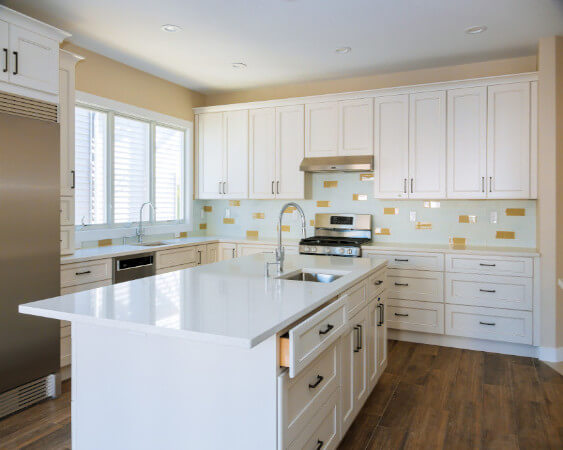
CHICAGO — Sales leads and project requests are robust, and revenue forecasts are bullish, but profit margins are reportedly being squeezed, COVID-19 remains a concern, and kitchen/bath dealers and designers continue to face supply-chain snafus, product price hikes, a skilled-labor shortage, and other headwinds to more robust growth in the months ahead.
That’s the primary consensus of a series of surveys conducted by Kitchen & Bath Design News and other industry sources attempting to get a handle on 2022 business prospects, following a year in which the kitchen/bath market witnessed sharp growth in both its remodeling and new-construction sectors, while COVID-19 continued to reshape the nation’s housing landscape, incomes and saving accounts rose, design trends and homeowner demographics evolved, and larger, more-multi-functional homes continued to remain a focus of consumer spending
But the pace of market growth, while projected to be palpable, has tapered off in recent months, and is expected to cool even more in the months ahead, as inflation scythes through the economy, product and labor availability continue to hamstring design/remodeling firms, housing affordability remains at historically low levels, and uncertainties tied to the coronavirus continue to loom.
KBDN’s nationwide survey of dealers and designers, conducted at the tail end of 2021, found that an overwhelming majority (86+%) of those polled said they expect their company’s revenue to either increase or remain roughly the same in 2022 compared to 2021. In contrast, less than 14% said they anticipate a revenue decline in 2022. Revenue gains are anticipated for both new and remodeled kitchens and baths, although dealers and designers are more bullish about revenue growth from kitchens (34.2%) than they are from baths (7.9%).
Dealers and designers also report that sales leads and project requests are up dramatically compared to the same time a year ago – understandable given how the current confluence of COVID-related demand, savings growth, home appreciation, government stimulus and other factors continue to spur homeowner spending. Specifically, a whopping 65+% of survey participants report their current sales leads are either somewhat or much higher now compared to a year ago, while only about 15% report that sales leads are lower and about 19% say they are about the same.
But while sales leads and strong, and revenue is generally expected to increase, surveyed dealers and designers paint a different picture when it comes to anticipated profit margins. For example, while 33.6% of those surveyed expect 2022 profit margins to increase, 14.2% expect margins to decline compared to 2021, and more than half (52.2%) expect margins to remain the same.
Other survey findings:
n With the COVID-driven emphasis on health and wellness, work-at-home arrangements and families sheltering in place, increases in client requests are being reported for products that range from universal design, smart appliances and aging-in-place elements to outdoor kitchens, anti-microbial materials and home ventilation.
n Pricing is apparently not a major factor for clients, many of whom seem willing to spend whatever it takes to get the kitchens and bathrooms that they want. For instance, while roughly 60% of the dealers and designers surveyed by KBDN say that pricing is either less important to clients or about the same as it was a year ago, far less (40%) say that pricing is more critical to clients now.
n While 51% of the design professionals surveyed say they are either extremely, very concerned or somewhat concerned about COVID-19 negatively impacting their business operations and profits in 2022, more than half (54%) say they are “not very” or “not at all” concerned, even in light of the new Omicron variant impacting the nation.
n While less than 5% of survey respondents report clients postponing or cancelling projects, nearly 44% report they are experiencing longer lead times for product deliveries and/or production and shipping delays.
The post Leads Robust, But Margins Being Squeezed, KBDN Survey Finds appeared first on Kitchen & Bath Design News.
Did you miss our previous article…
https://www.texaspiekitchen.org/?p=851
Pace of Market Growth Seen Cooling After Strong 2021 Gains

HACKETTSTOWN, NJ — Ongoing supply-chain disruptions coupled with labor shortages, higher material costs and emerging uncertainties wrought by COVID-19 are cooling the pace of kitchen and bath market growth in the wake of an exceptionally strong year in 2021.
According to the latest Market Forecast Report issued in recent weeks by the National Kitchen & Bath Association, the 2021 kitchen and bath industry posted healthy, double-digit gains over 2020, although growth projections were “pared back a bit” compared to the NKBA’s previous (July 2021) forecast, “as lingering issues caused by the pandemic seem to be catching up to consumer sentiment.”
The NKBA projected total 2021 revenues of $167 billion, a 19% increase over the $141 billion that was posted in 2020, but lower than earlier forecasts, which predicted that full-year revenue totals would reach $171 billion.
“2021 has been like none other for our industry, as strong growth across virtually every sector led to record revenues,” said Bill Darcy, CEO of the Hackettstown, NJ-based NKBA. However, some homeowners, faced with price increases related to supply chain disruptions, “are deferring projects until they’ve enough saved to get exactly what they want, or in the hope that costs will come down,” Darcy added.
The NKBA reported a nearly 10% year-over-year growth in the kitchen and bath remodeling sector in 2021, and a 26% growth in the new construction sector. Premium projects were up by more than 22%, while low-end projects grew about 11%, “suggesting a cooling of the DIY trend,” the NKBA said.
“These findings are very encouraging and indicate that…growth should be sustained into 2022,” Darcy said.
In related news, the latest NKBA/John Burns Real Estate Consulting “Kitchen & Bath Market Index,” issued in December, remained in “solidly expanding territory,” but cooled from the record number posted in the previous quarter. Expected future activity “also tailed off a bit,” having peaked in the first quarter of 2021, reported the NKBA and John Burns.
“In relative terms, the outlook remains quite positive,” with association members projecting about a 9% sales gain in 2022 – “impressive if it holds true, given 2021’s strong growth,” said the NKBA, adding that supply chain disruptions, cost of materials and availability of skilled labor are hampering the industry’s ability to take full advantage of strong demand…as NKBA members scramble to meet client needs, with most resorting to brands they’ve never previously used.”
Other findings of the NKBA/John Burns Report were as follows:
n The challenging business environment has forced the industry to become “supplier/vendor agnostic” – prioritizing product availability above other factors. The industry has also moved toward sourcing more domestic-based products in an attempt to circumvent global supply chain issues. Manufacturers are prioritizing high-value products to protect profit margins while stockpiling excess materials to help ease lead times and overall constraints.
n The kitchen and bath industry continues to feel the pains of ongoing supply chain challenges. Port congestion is further compounding strained supply chains that are still recovering from the effects of Winter Storm Uri and Hurricane Ida, while labor shortages are causing delays in the trucking industry. Meanwhile, lead times for domestic and foreign raw materials are well over 6+ weeks and has many within the sector struggling to keep up with demand in today’s economy. As a result, product backlogs extend well into 2022 as these difficulties prevent those in the industry from staffing full production schedules.
n Even in the face of ongoing challenges, the industry remains cautiously optimistic about the health of the sector. Despite projects being pushed into 2022, the industry is continuing to see demand for building and construction projects as 84% of firms report low postponement rates and 90% report low cancellation rates relative to their overall project volume.
The post Pace of Market Growth Seen Cooling After Strong 2021 Gains appeared first on Kitchen & Bath Design News.
Kitchen of the Month Winner for Cabinet Refacing for June
Kitchen Transformation by Kitchen Solvers of Columbus
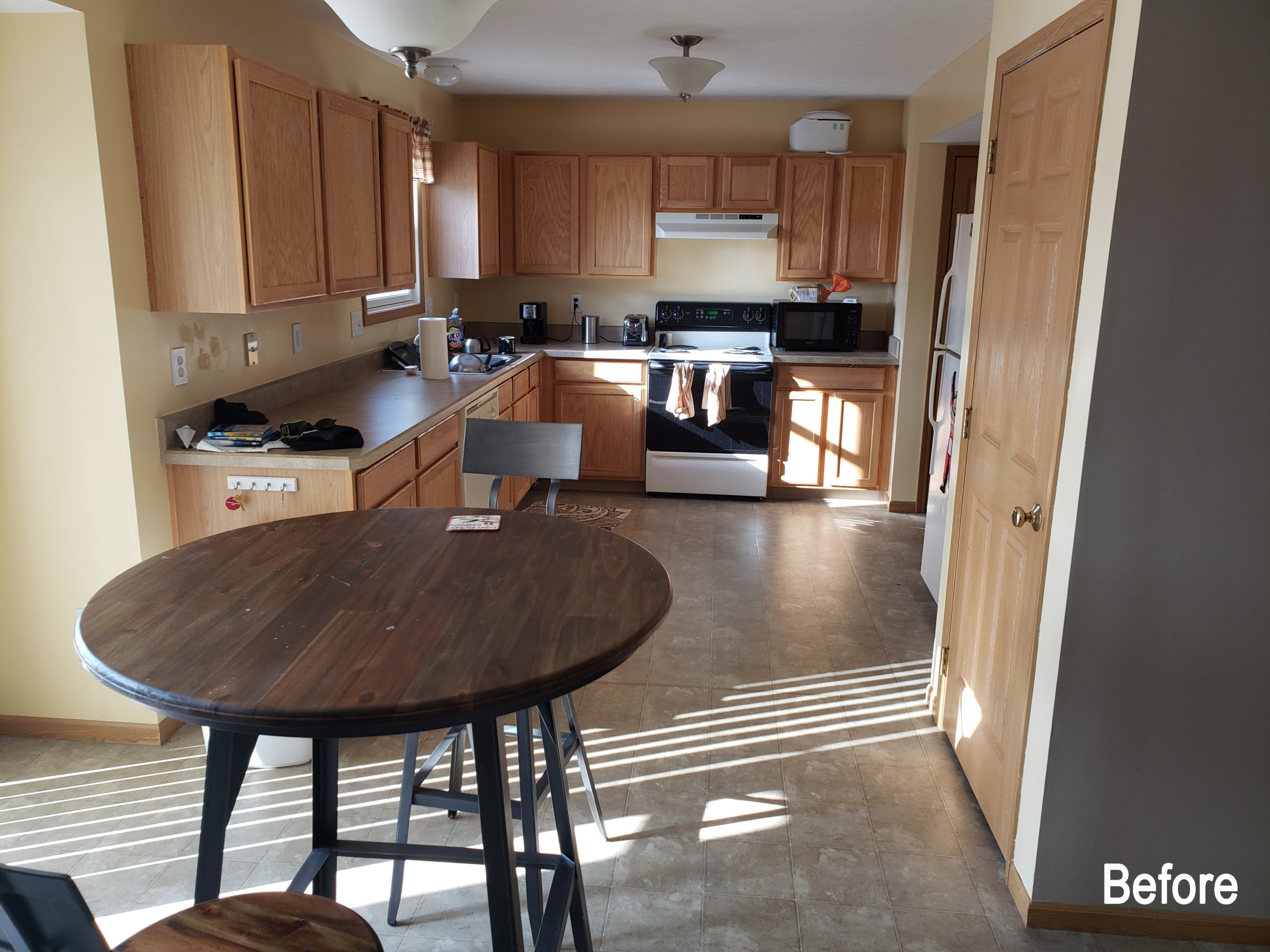
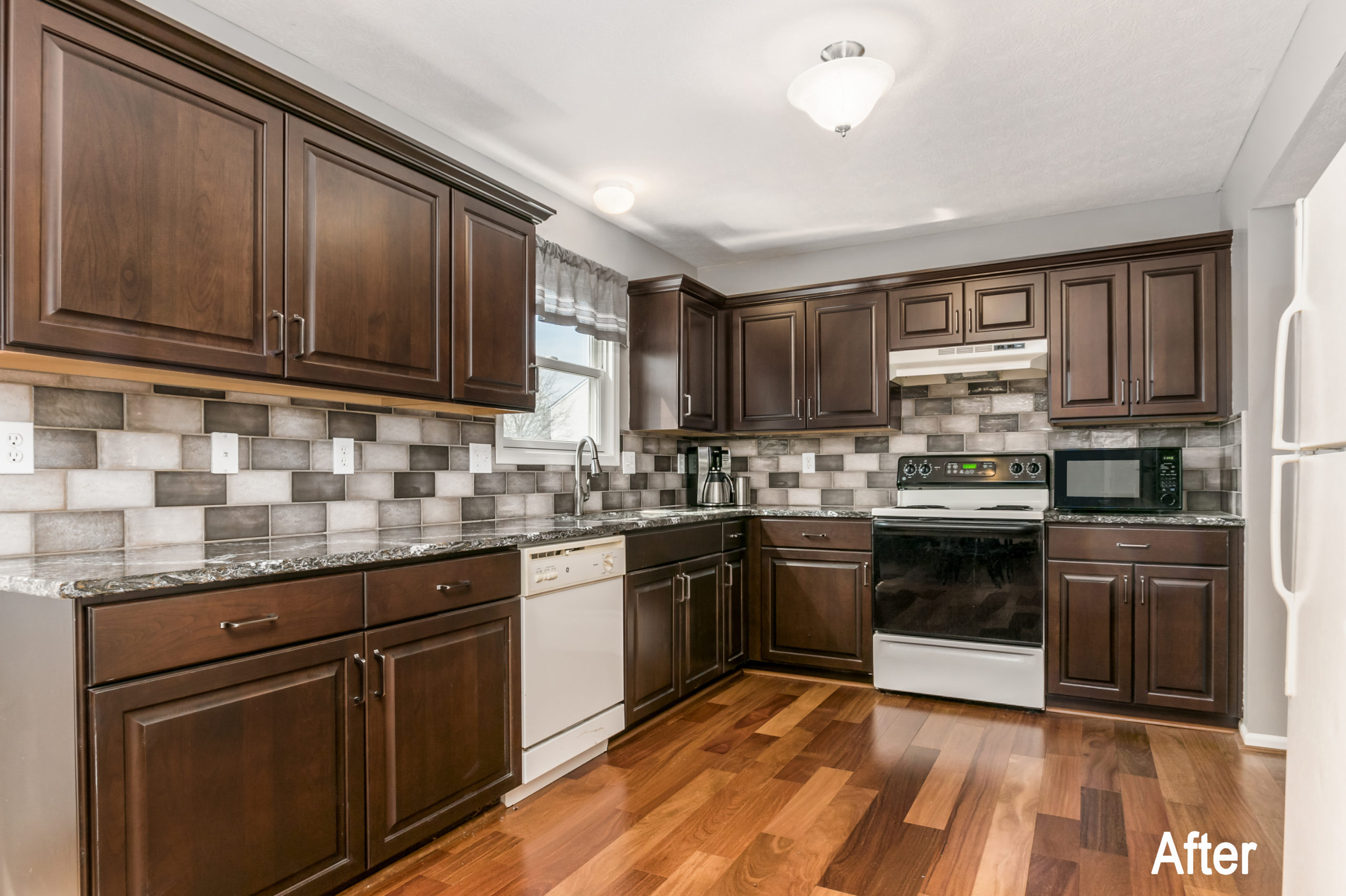
Project Location: Dublin, Ohio
Remodel Style: Traditional
Remodel Type: Cabinet Refacing
Type of door style: Glen Haven
Door Material: Cherry – Natural Stain
Door Color: Java (V3)
Countertop type: Cambria – Quartz
Countertop color: Ellesmere
Backsplash: Quayside
Flooring: Pre-engineered hardwood
For more information about this project, please visit Kitchen Solvers of Columbus’ Blog.
Find a location near you.
The post Kitchen of the Month Winner for Cabinet Refacing for June appeared first on Kitchen Solvers.
Did you miss our previous article…
https://www.texaspiekitchen.org/?p=844
William Ohs Acquires PA Luxury Cabinet Supplier
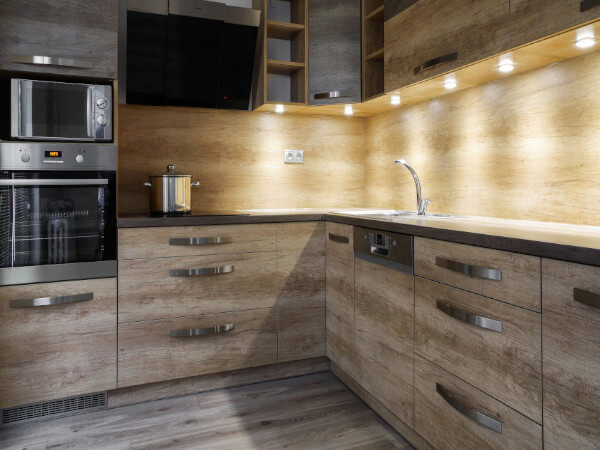
DENVER — William Ohs, the Denver-based manufacturer of luxury cabinetry and furniture, has acquired Draper DBS, a Bucks County, PA custom cabinet supplier, “merging two companies that are well-established and respected in the luxury cabinet industry,” the companies announced.
Terms of the transaction were not disclosed.
“The combination of Draper DBS and William Ohs brings together the ideas and manufacturing concepts of two legendary visionaries in the luxury kitchen market,” said Rick Casey, v.p./manufacturing for William Ohs, founded in 1972 by industry pioneer Bill Ohs. “The combined synergies create both exciting and unparalleled opportunities moving forward,” Casey added.
William Ohs and Draper DBS “will be able to provide the same detail-oriented approach to a larger market while capitalizing on increased manufacturing efficiencies,” corporate officials said.
“I am excited and humbled to be drawn into the most creative act of wood joinery in the industry, the dovetailing of the crafts, hearts, and creative legacies of Draper DBS and William Ohs,” said William Draper, founder of Draper DBS. “This will be an intertwining of our combined strengths, histories, and visions to cultivate the future inspirations of all those who love great and evolving furnishing design.”
The post William Ohs Acquires PA Luxury Cabinet Supplier appeared first on Kitchen & Bath Design News.